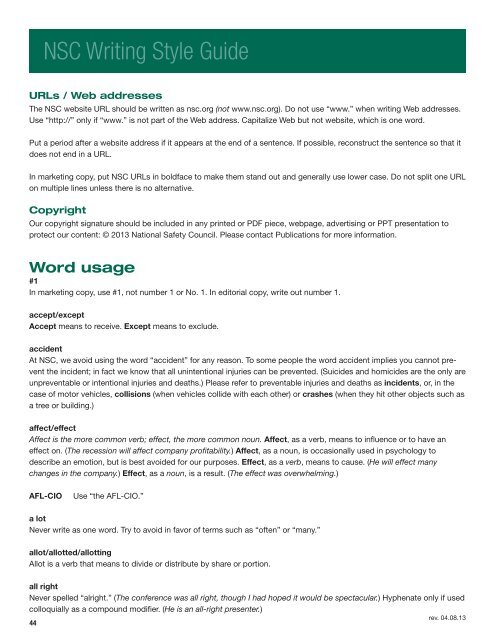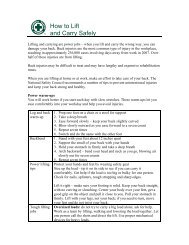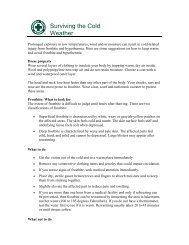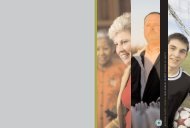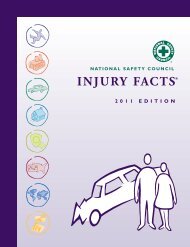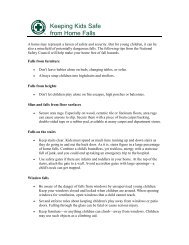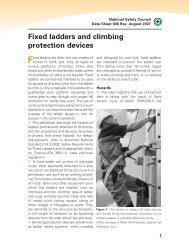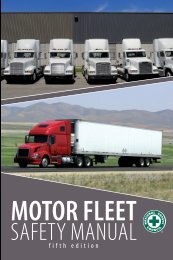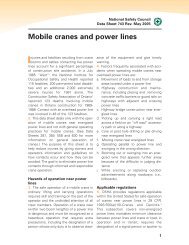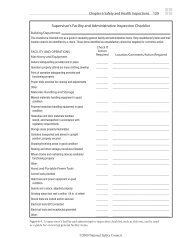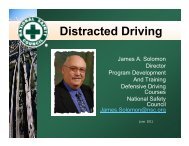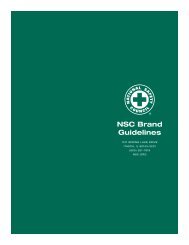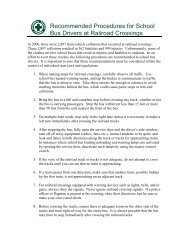NSC_Identity_Writing_style-guide - National Safety Council
NSC_Identity_Writing_style-guide - National Safety Council
NSC_Identity_Writing_style-guide - National Safety Council
Create successful ePaper yourself
Turn your PDF publications into a flip-book with our unique Google optimized e-Paper software.
<strong>NSC</strong> <strong>Writing</strong> Style Guide<br />
URLs / Web addresses<br />
The <strong>NSC</strong> website URL should be written as nsc.org (not www.nsc.org). Do not use “www.” when writing Web addresses.<br />
Use “http://” only if “www.” is not part of the Web address. Capitalize Web but not website, which is one word.<br />
Put a period after a website address if it appears at the end of a sentence. If possible, reconstruct the sentence so that it<br />
does not end in a URL.<br />
In marketing copy, put <strong>NSC</strong> URLs in boldface to make them stand out and generally use lower case. Do not split one URL<br />
on multiple lines unless there is no alternative.<br />
Copyright<br />
Our copyright signature should be included in any printed or PDF piece, webpage, advertising or PPT presentation to<br />
protect our content: © 2013 <strong>National</strong> <strong>Safety</strong> <strong>Council</strong>. Please contact Publications for more information.<br />
Word usage<br />
#1<br />
In marketing copy, use #1, not number 1 or No. 1. In editorial copy, write out number 1.<br />
accept/except<br />
Accept means to receive. Except means to exclude.<br />
accident<br />
At <strong>NSC</strong>, we avoid using the word “accident” for any reason. To some people the word accident implies you cannot prevent<br />
the incident; in fact we know that all unintentional injuries can be prevented. (Suicides and homicides are the only are<br />
unpreventable or intentional injuries and deaths.) Please refer to preventable injuries and deaths as incidents, or, in the<br />
case of motor vehicles, collisions (when vehicles collide with each other) or crashes (when they hit other objects such as<br />
a tree or building.)<br />
affect/effect<br />
Affect is the more common verb; effect, the more common noun. Affect, as a verb, means to influence or to have an<br />
effect on. (The recession will affect company profitability.) Affect, as a noun, is occasionally used in psychology to<br />
describe an emotion, but is best avoided for our purposes. Effect, as a verb, means to cause. (He will effect many<br />
changes in the company.) Effect, as a noun, is a result. (The effect was overwhelming.)<br />
AFL-CIO<br />
Use “the AFL-CIO.”<br />
a lot<br />
Never write as one word. Try to avoid in favor of terms such as “often” or “many.”<br />
allot/allotted/allotting<br />
Allot is a verb that means to divide or distribute by share or portion.<br />
all right<br />
Never spelled “alright.” (The conference was all right, though I had hoped it would be spectacular.) Hyphenate only if used<br />
colloquially as a compound modifier. (He is an all-right presenter.)<br />
rev. 04.08.13<br />
44


